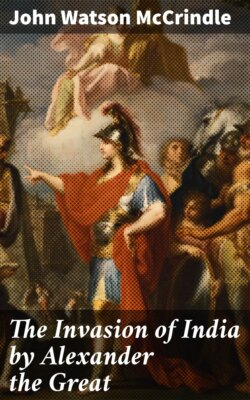Читать книгу The Invasion of India by Alexander the Great - John Watson McCrindle - Страница 7
На сайте Литреса книга снята с продажи.
Arrian
ОглавлениеTable of Contents
Arrian, who is universally allowed to be by far the best of all Alexander’s historians, was at once a philosopher, a statesman, a military commander, an expert in the tactics of war, and an accomplished writer. He was born towards the end of the first century of our aera at Nikomêdeia (now Ismiknid or Ismid), the capital of Bithynia, situated near the head of a deep bay at the south-eastern end of the Propontis or Sea of Marmora. He became a disciple of the Stoic philosopher Epiktêtos (much in the same way as Xenophon attached himself to Sôkrates), and gave to the world an abstract of his master’s lectures, together with an Encheiridion or manual of his philosophy—a work which was long and widely popular. Under the Emperor Hadrian he was appointed in A.D. 132 prefect of Kappadokia. He had not long filled this office when a large body of wild Alan horsemen made one of their formidable raids into his province. They had hitherto proved irresistible, but on this occasion they were completely foiled by the skilful strategy and tactics of Arrian, who expelled them from his borders before they had secured any plunder. In Rome he was preferred to various high offices, and under Antoninus Pius was raised to the consulship. In his later years he retired to his native city, where he occupied himself in composing treatises on a considerable variety of subjects, but chiefly on history and geography. He died at an advanced age in the reign of the Emperor Marcus Aurelius.
His account of Alexander’s Asiatic expedition was followed by a treatise on India called the Indika. The first part of this work, which gives a description of India and its people, was based chiefly on the Indika of Megasthenes; and the second part, which narrates the famous voyage of Nearchos from the mouth of the Indus to the head of the Persian Gulf, was based on a journal kept by Nearchos himself. The work is but a supplement to his history. He speaks himself with noble pride of this great work. “This I do assert,” he says, “that this historical record of Alexander’s deeds is, and has been from my youth up, in place to me of native land, family, and honours of state; and so I do not regard myself as unworthy to take rank among the foremost writers in the Greek language, if Alexander be forsooth among the foremost in arms.” “Quel délire de l’amour propre!” here exclaims Sainte-Croix. His merits as an author are thus well stated by a writer in Smith’s Classical Dictionary: “This great work (the Anabasis) reminds the reader of Xenophon’s Anabasis, not only by its title, but also by the ease and clearness of its style.... Great as his merits thus are as an historian, they are yet surpassed by his excellences as an historical critic. His Anabasis is based upon the most trustworthy historians among the contemporaries of Alexander.... One of the great merits of the work is the clearness and distinctness with which he describes all military movements and operations, the drawing up of the armies for battle, and the conduct of battles and sieges.”
